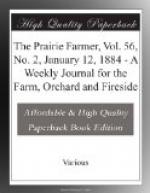* * * * *
Several parties have written me—one from Missouri, another from Indiana, and a third from Kentucky, that they have seed corn for sale, cheap and in quantity. I have no doubt of it, and I have accordingly advised each to advertise it in THE PRAIRIE FARMER, if they are really desirous of selling, stating briefly what variety, where grown, and at what price. I should be glad to advertise it for them gratuitously, but the contract of THE PRAIRIE FARMER with its contributors contains a clause to the effect that “they shall neither use its columns to grind their own axes nor the axes of anybody else.” With the recourse of early frosted corn to go to, and the assistance of appropriately selected seed from abroad, the gross mistakes and disappointments of 1883 are pretty certain to be avoided in 1884.
* * * * *
No doubt many who are more or less familiar with the Reports on Hog Cholera in the official publication of the Department of Agriculture, ask themselves why Dr. Detmers is singled out by Frenchmen as the sole authority on swine diseases, when his colleagues of the commission, Dr. Salmon and Laws went nearly as far as he did in their extravagant statements. But the prominence Dr. Detmers has obtained in the estimation of Frenchmen is now explained in this: At a late sitting of the French Academy of Sciences that eminent savant, Pasteur, referred to him and his investigations in flattering terms. Giving an account of the discovery of the microbe which causes the rouget of swine in France, Pasteur said: “Respect for historic truth compels me to state, however, that in the month of March, 1882, the microbe of the rouget was discovered at Chicago, in America, by Professor Detmers, in a series of investigations which did great honor to their author.” With the indorsement of one of the most eminent scientists in the world, before a body equally distinguished, Dr. Detmers may find some compensation in being singled out as the scape goat for an unfortunate commission which has cost the country many millions.
B.F.J.
* * * * *
REMEMBER that $2.00 pays for THE PRAIRIE FARMER one year, and the subscriber gets a copy of THE PRAIRIE FARMER COUNTY MAP OF THE UNITED STATES, FREE! This is the most liberal offer ever made by any first-class weekly agricultural paper in this country.




